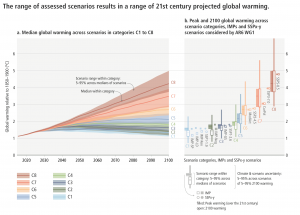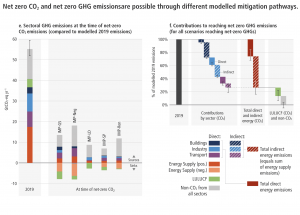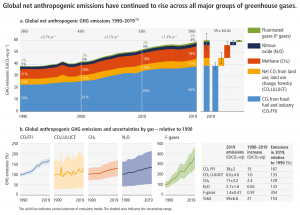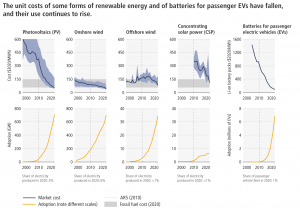
The third and final climate change report by the Intergovernmental Panel on Climate Change seeks deep cuts in greenhouse gas emissions to keep global warming within the 1.5 degrees Celsius target set by the Paris Agreement 2015. The 3,000-page report is a damning indictment of the fossil fuel industry that exerts influence on the energy policies of world nations. The earlier IPCC reports had focused on the vulnerability of world nations to global warming. The current report has come up with possible solutions that can run afoul of the fossil fuel industry and oil-producing nations.
In the absence of strong policy action by world nations, greenhouse gas emissions will push median global warming to about 3.2 degrees Celsius by the end of the century, warns the report. Climate scientists estimate that if the Earth warms to more than 1.5 degrees Celsius above pre-industrial levels, it will set off a series of irreversible climate change events that could threaten life on the planet. The Paris Agreement in 2015 has set this warming target, but the world is struggling to achieve it.
READ I India-UK FTA: Unleashing the bilateral trade potential


Climate change report issues stern warning
To achieve the Paris Agreement target, greenhouse gas emissions must peak before 2025, the report says, adding that the emissions must be cut by 43% in the next five years and by 84% by mid-century. The report seeks a 95% drop in global use of coal, 60% of oil, and 45% of gas by 2050 compared with 2019 levels.
The report goes on to debunk the myth that poor nations need fossil fuels to address poverty. It explains that there are technologies that can address poverty without compromising on climate change goals and that the only obstacle to adopting them is the fossil fuel industry’s economic interests.


Surprisingly, the report’s findings against the fossil fuel industry are mysteriously absent from the report’s ‘summary for policymakers’, which needed approval from the representatives of 195 governments. Leaked reports say representatives from Saudi Arabia forced multiple references to carbon capture and storage and managed to water down the references on the fossil fuel industry.
Despite such influences, the report manages to focus on the influence of the fossil fuel industry on policymaking and its efforts to spread certain myths that either outrightly negate climate change or create confusion on strategies to stop global warming.
After the report came out in the first week of April, one of its key findings was widely misinterpreted. The report says greenhouse emissions are expected to peak ‘at the latest before 2025’. This was interpreted as saying the world can keep on emitting carbon for the next three years without compromising on its efforts to curb global warming. Scientists deem this interpretation incorrect and call for emission cuts.
Glen Peters of the Centre for International Climate Research in Oslo and the IPCC lead author called the choice of words unfortunate. “That will have negative consequences”, he said. The confusing language can be attributed to the technical expression of climate models that use five-year blocs to study climate variations.
Sajna Nair is a former banker. Her areas of interest are environment, art and culture.

